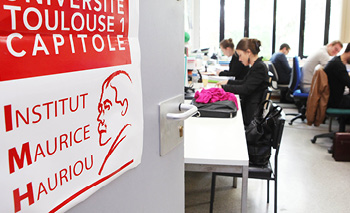- Research unit
Coordonnées
Université Toulouse Capitole,
2 rue du Doyen-Gabriel-Marty
31042 TOULOUSE Cedex 9
- Phone :
- 05 61 63 38 95
- Email :
- imh@ut-capitole.fr
- On the Internet :
- http://imh.ut-capitole.fr/
General information
Authority : Ministry
Reference : EA 4657
Departments : Sciences de la société
Activities
Research topics
Nature and purpose of the Maurice Hauriou Institute:
The scientific objective is to develop and valorize research in Public Law, more specifically in the fields of Administrative Law and Constitutional Law.
- Areas of research
The team works in four areas through a thematic, multidisciplinary and problem-focused approach. Research work is structured around a number of well- established researchers (authors of books, of columns, symposium organizers, thesis directors, collaborating with research contracts…) capable of pooling in the activity of other members and other teams. The objective is to offer greater visibility to the innovative research work carried out in Public Law in Toulouse. Emphasis is laid on specialized fields while at times keeping the focus on subjects from mainstream fields, depending on the size of the team and on its home establishment.
- Area 1: Public authority and fundamental Rights
The aim is to return to a more balanced approach of public institutions and of their action between institutional law and constitutional litigation. In the Enlightment Age, the organization of political and administrative institutions aimed at setting limits to power. The area of work considered here focuses on the issue of the exercise of freedoms granted within and by institutions. This issue falls within both fields of administrative law and constitutional law. Studying fundamental rights implies a multi and trans-disciplinary approach of individual prerogatives legally guaranteed through a « participation-protection » relation to public authority. Therefore, this research work requires re-examining the theories of the division of powers including fundamental rights institutions and their connection with users’ rights when dealing with administrative services.
- Area 2: Procedural law and administration of justice
Including administrative litigation and constitutional litigation, this area of research focuses on the organization of jurisdictions and litigation. Particular emphasis is laid on the analysis of the standard record of fair trial looking at the way proceedings and the public justice system are being administered. The dispute over the constitutional issue is currently a priority and will be pursued as such. The comparative approach will remain significant. Indeed, the systematic comparison of the main types of trials has given birth to a comparative science, i.e comparative procedural law confronting the European and American trial standards.
- Area 3: Public patrimonial law (D2P)
The approach here is a unique one at the national level. Researchers study administrative and constitutional rights from a definitely multidisciplinary patrimonial perspective, using classical techniques in administrative law and constitutional law, but also in general private law, business law and financial law. The objective is to build a new public heritage law that will comprehend the interdependence of academic subjects dealing with the acquisition and management of property and assets by public bodies. The principle of independent legislations is examined so as to consider doing away with its adverse effects. Concrete applications particularly concern the fields of public property law, public procurement and public works law, expropriation law, complex contractual schemes, urban planning law, real estate law, environment law, global public goods.
- Area 4: Health and biotechnologies
Beyond the study of the organization of the welfare system, of its missions and prospects of change, the current and future research work analyzes the foundations of the medical relationship and the rights and obligations of the health stakeholders, from patients to health professionals. More specifically, the current regulatory framework is being confronted to technological changes in a fast-moving field initiating multiple questioning, whether it concerns the right to privacy, individual freedoms, protection of personal data, regulation of health activities and products, or of liability regimes. Biotechnologies, nanotechnologies, robotics, STIC, neurosciences have become areas that must now be investigated by jurists with a necessary multidisciplinary approach which is already the preferred dimension at the IMH.

